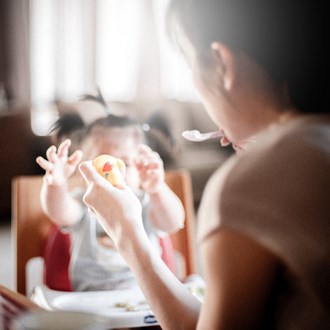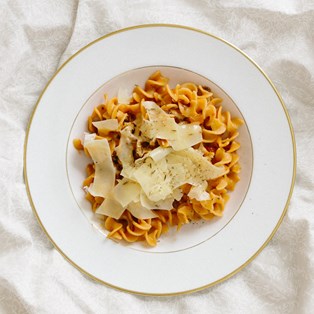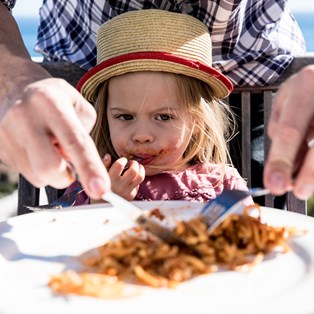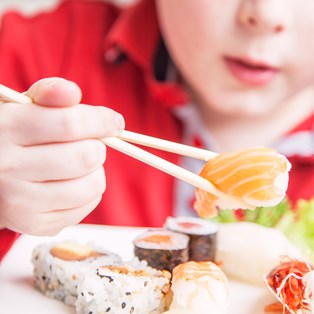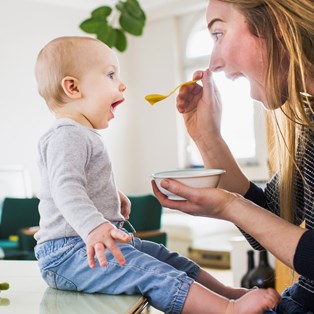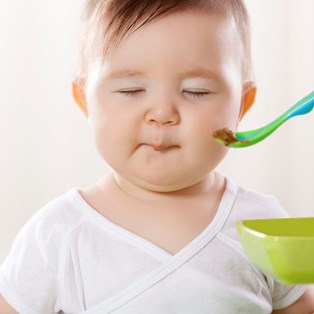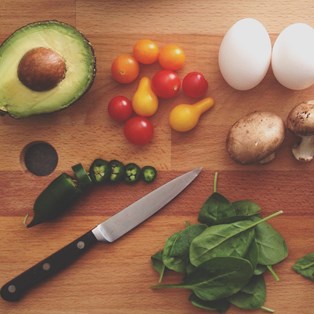Starting your baby on solid foods

What you need to know
By Kate Di Prima
April 05 2023
If you’re starting your bub on solids, there are a few guidelines to follow when it comes to meal time.
What are the signs my baby is ready for solid foods?
At round the age of six months your little one will be ready for the challenge of first foods. Watch for signs of readiness, such as an increased appetite, showing more interest in food, particularly when watching you eat, or trying to imitate your habits by opening his mouth and reaching for your food.
Starting solids before bub is really ready can cause tummy discomfort and potentially puts him at a higher risk of choking. Make sure that your little one has good head and neck control and the ability to sit up with support.
The first solids are really a boost to his current milk feeds, with these new tastes and textures almost as important for learning how to eat and for developing tooth and jaw development as they are for nutrition. When offering first foods, always breast or bottle feed before solids so bub is in a more settled mood and doesn’t fill his little tummy up before his milk.
Begin with around one to two teaspoons of solids after a breast or formula feed, gradually increasing to two to three tablespoons of solids around three times each day.
When offering first foods, always breast or bottle feed before solids so bub is in a more settled mood and doesn’t fill his little tummy up before his milk. Begin with around one to two teaspoons of solids after a breast or formula feed, gradually increasing to two to three tablespoons of solids around three times each day.
What about food intolerances when introducing solids?
Allergies are a key concern for many parents when starting babies on new foods. Currently, the notion of delaying potentially allergenic foods well beyond six months is poorly supported by scientific evidence, with a theory that delaying certain foods for the first few years may actually potentially increase the risk of allergies.
Further studies in this area are needed to provide concrete evidence, however parents with no family history of allergy should not delay foods without the guidance of their GP. If this is a concern, speak to your GP, dietitian or child health nurse. Breastfeeding during the first six months of life and during the introduction of solids may also help prevent food allergies, continuing until at least 12 months or longer if chosen by mum and bub.
There still remains a lot of confusion surrounding the order of introduction of foods. Common themes include no egg yolk or fish until the first birthday, however, these are now included in the recommendations of first foods, as they provide valuable omega-3 fats, protein and some iron. Check online for the most up-to-date guidelines.
How do I start with homemade solid foods?
While there is an array of ready- made baby foods available, making your own can be easy, and helps you to introduce your family’s style of eating from early on. Blend a little roast meat or grilled chicken breast with breastmilk or sweet potato from dinner, or try making purées ahead of time and freezing them in covered ice cube trays to defrost at a later date – a huge money and time saver!
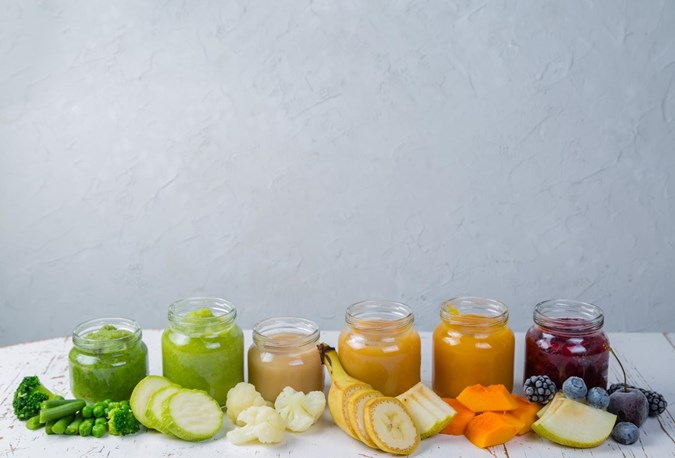
getty images
How can I prevent choking when my baby starts sold foods?
Always supervise your little one at meal times to ensure he doesn’t choke. Make sure all foods are of appropriate texture, avoiding foods that are hard to chew, or crunchy without being able to dissolve well with saliva. Cold foods must be kept and served below 5°C and hot foods heated to 60°C and then cooled and served immediately to prevent bacteria multiplying.
Never give lightly cooked meat or runny eggs to an infant, making sure that eggs are cooked until both the white and yolk are cooked through.
Can I give my baby water when he's eating?
Before six months, exclusively breastfed babies do not need to be given water as it can lead to electrolyte imbalances.
After this age, cooled boiled tap water is ideal for thirsty littlies. Milk can be used in cooking but should not be given as a drink until after 12 months of age. Don’t give infants fruit juice as it can encourage diarrhoea, and avoid caffeinated drinks such as tea or coffee as little kidneys aren’t able to deal with the extra caffeine and they may cause sleep disturbances. Soft drinks have no place in an infant or young child’s diet, even as a treat.
Guidelines for feeding your baby solid foods
The 2013 Infant Feeding Guidelines were released with some key messages. Until around six months, breast milk or formula is enough to provide bub with all the nutrition required, however as he grows and develops, added nutrition is essential to maintain stores of vitamins and minerals, in particular, iron and zinc. Previously, many babies were started off with soft fruits and vegetables, but with the realised priority of adequate iron and zinc intake for proper cognitive development, rich food sources such as puréed red meat, chicken, fish and iron-fortified baby cereals are recommended to be more appropriate. For bubs in vegetarian families, eggs, legumes and tofu can be included, but it is important to be aware of the absorption of vegetarian-based sources.
Previously, many babies were started off with soft fruits and vegetables, but with the realised priority of adequate iron and zinc intake for proper cognitive development, rich food sources such as puréed red meat, chicken, fish and iron-fortified baby cereals are recommended to be more appropriate. For bubs in vegetarian families, eggs, legumes and tofu can be included, but it is important to be aware of the absorption of vegetarian-based sources.
As your little one’s intake becomes more varied, full-fat dairy products such as cheese and yoghurt offer calcium, protein and fat for good growth (no low fat for children under two years) and fruits and vegetables offer excellent sources of vitamins, minerals and fibre to get his digestive system working. Don’t stay on blended textures for too long – move from purées to mashes to small lumps as soon as bub is ready.
Including foods similar to what the family eats is a good way to get him accustomed to his future eating habits, but never add salt, as little kidneys are not able to process it as well as adult kidneys. Also, avoid added sugars and syrups so as not to encourage a preference for only sweet foods and don’t give honey until at least 12 months due to a risk of botulism.
Nutrient-poor foods such as cakes, ice-cream, biscuits and potato chips should be avoided as they often contain high levels of saturated fat, sugar and salt while missing vital nutrients bub needs to thrive.




